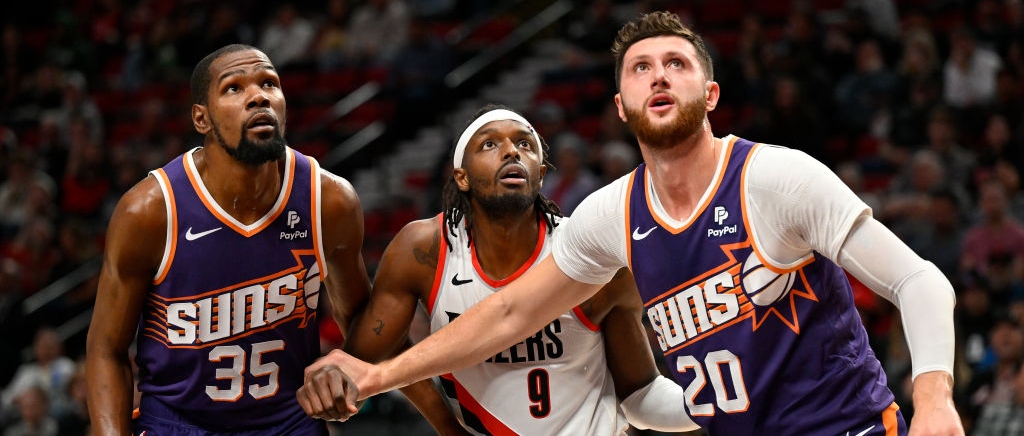
The Phoenix Suns have almost a completely different roster than they had a year ago when they were ousted in the second round by the eventual champion Denver Nuggets in six games. In that series, Phoenix’s lack of depth was exposed as they needed Herculean efforts from Devin Booker to pick up their two wins by an average of six points, and lost the other four games by an average of 17 points.
This summer, they went out and doubled down on building a star-studded lineup, swapping Chris Paul for Bradley Beal and shipping out Deandre Ayton for Jusuf Nurkic. Overall, just five players remain from last year’s playoff roster, as they completely overhauled the roster and added a new head coach in Frank Vogel. The expectations are sky high in Phoenix, but it’s rare for a team with that much turnover and that many players that are new to each other to reach their max potential in the first year. If they are to challenge for a championship this season, they’ll need health (like everyone else), to establish quick continuity, and answer a couple lingering questions about this roster.
Biggest Question: Will They End Up Needing To Add A Point Guard?
The Suns are going to start the season putting the basketball in Devin Booker’s hands and having him run the offense, with the understanding there will be plenty of touches for Bradley Beal and Kevin Durant as initiators as well. As they completely overhauled their roster this summer, they focused their efforts on adding wing and frontcourt depth, trying to give Frank Vogel a variety of lineup combinations that can lean more defensive or offensive depending on the situation. However, they never really bolstered their point guard depth beyond the initial addition of Jordan Goodwin in the Beal trade, as both Chris Paul and Cameron Payne are gone from the roster a year ago. It’s clear their plan is to spread out offensive responsibilities across the roster, with Booker as the nominal point guard but running offense through Beal, Durant, and even Jusuf Nurkic as well to take some of the creative burden off of Booker’s shoulders.
What is going to be important in the first few months of the season leading into the trade deadline is for Frank Vogel, James Jones, and the rest of the Suns decision makers to be extremely honest in their evaluation of this team, because it’s very likely they’ll look just fine doing this in the regular season. However, in those bigger games and bigger moments, they’ll be keeping a very close watch on how the ball moves and how things flow offensively, because those will be indicators of whether this can work come playoff time or if they might want to take a look on the trade market for a veteran point guard just to add a steady hand to the roster.
One of the hardest things to do for a team that’s just been constructed is to make decisions that benefit the playoff roster based on regular season results, but Phoenix will certainly need to do its best self-scouting to determine if this group can reach its offensive peak as is or if they need another distributor to maximize their talent.
X-Factor: Jusuf Nurkic
When the Suns jumped into the Damian Lillard deal to send Deandre Ayton to Portland for Jusuf Nurkic, there were some reports that Phoenix felt the move was addition by subtraction, as it was clear the relationship with Ayton in that organization was frayed beyond repair. That may very well be the case, but Ayton’s top-level of play has been higher than Nurkic’s in recent years and the two bring very different skillsets to the table. That means there’s ample pressure on Nurk to find another gear alongside a new star trio, particularly on the defensive end.
On offense, I think the Nurkic fit could be better than Ayton, just based on what Nurkic is willing to do that Ayton wasn’t satiated in doing. Ayton wanted more touches, as happens with a former No. 1 overall pick on a big contrct, while Nurkic will be a more willing tertiary contributor. He’s a big body that sets solid screens, and while he’s certainly not the vertical roll threat Ayton was, he’s a good short roll man, with solid touch and much better passing acumen than Ayton. That passing ability figures to be where he impacts the game the most, as they can trust him to keep the ball moving, find cutters out of the high post, and run some different dribble handoff actions to apply stress to the defense with their stars all working off the ball.
Defense is where most of the concern lies with this Suns team with Nurkic swapped in for Ayton. Of their top four, Durant is the only plus defender and with Ayton gone, they are seriously lacking in terms of rim protection. Ayton’s defensive issue wasn’t skill based but engagement based, as he had a tendency to lower his effort level when he wasn’t having the offensive impact he wanted. That said, he was a rim deterrent simply by being a giant with athleticism in the paint and he was a strong post defender thanks to his size and length. Nurkic is not close to the same level as an athlete or rim protector, and it’s going to be fascinating to see how Frank Vogel crafts a defense with Nurk at the five. Vogel has long leaned on very good shot-blocking bigs as the anchor for his defenses, dating back to Roy Hibbert, but won’t have that in Phoenix this year. Finding a way to get a net-neutral defense out of this group with Nurkic at the five will be the task for Vogel, but doing so will require some creativity in lineups and a different structure than he’s usually put together on that end.
